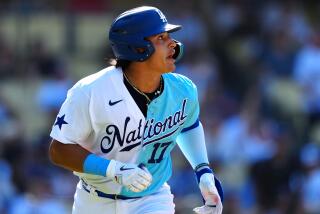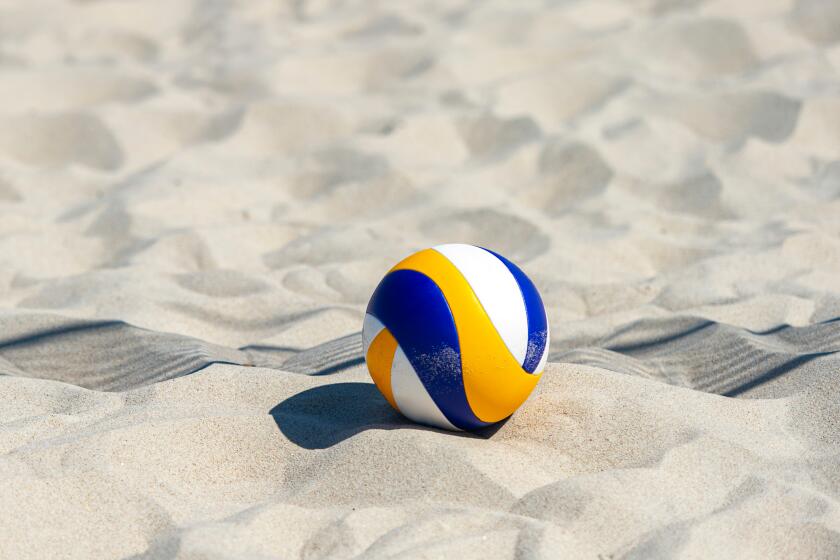Paying Price for Baseball : Three More Cubans Decide to Leave Families Behind
- Share via
Alexis Cabreja could get used to this baseball-hero business real quick.
In Havana, Cuba, where he lived for 24 years, he had to stand in line for everything, from buses to his family’s ration of rice, beans, sugar and--when it was available--meat. This, even though he was one of the top baseball players in a baseball-mad country.
Not even 30 minutes into his first workout in the United States, however, Cabreja had a line waiting to serve him . Slumping wearily on a dugout bench at L.A. Pierce College last week, he held up an empty plastic bottle and spit out one of the few English words he knows: “Water!”
In a flash, there was a fight over the honor of filling the container.
For Cabreja, it must have seemed a dream. But it’s only part of a dream come true for Cabreja and fellow Cubans Osmani Estrada and Ivan Alvarez, who defected in Mexico earlier this month and will soon be seeking political asylum--and a chance at professional baseball--in this country.
“I want to play with the best in the world,” said Cabreja, an outfielder who played for six years in Cuba’s top league. “I’m here because I want to improve myself and see how far I can go. We want to demonstrate what we can do.”
This month’s defections were not the first by Cuban athletes hoping to play baseball in the United States. Rene Arocha, a pitcher on the Cuban Olympic team, slipped away from his teammates in the Miami International Airport Hotel in July of 1991. That incident quickly became a major story because Arocha was the first Cuban baseball player to defect in 31 years.
Before Fidel Castro’s revolution, Cuba was a major supplier of talent for U.S. baseball clubs, sending more than 120 players to the major leagues before 1961. Some believe that the recent defections mark the start of a new stream of Cuban talent into professional baseball.
“In the next couple of years, there’s going to be a few more Cubans,” says Gus Dominguez, the Cuban-American who negotiated Arocha’s contract with the St. Louis Cardinals and who is representing Cabreja, Estrada and Alvarez. “You’ll see things like this more often.”
Jay Hankins, director of scouting for the Philadelphia Phillies, said he has been told that the Cuban government might be ready to ease the process by relaxing its hard line and allowing its players to sign contracts with U.S. teams. That’s an opinion many in baseball share.
“We’ve gotten some indication that could happen in the next year or two,” Hankins said.
The timing appears right. More than three decades of economic sanctions by the United States has crippled Cuba, and the disappearance of Communist regimes in Eastern Europe--taking with them favorable trade agreements and financial aid--has left the government isolated and on the brink of collapse. In response, Cuba has opened industries such as tourism and food production to capitalist investors for the first time since Castro came to power.
The island’s strong baseball program also has the potential to provide the government with at least some of the money it will need to ease the current crisis, which Castro has termed the “Special Period in Time of Peace.”
Fred Claire, the Dodgers’ executive vice president in charge of player personnel, predicts a “gold rush” when Cuba opens its doors to major league scouts.
Much of that gold would probably stay in Cuba, however. Following the lead of the former Czechoslovak and Soviet sports ministries and their dealings with the NHL, the Castro government is almost certain to charge a sizable fee for access to its players.
Most U.S. clubs are likely to consider that a bargain. For example, recent first-round draft picks such as Brien Taylor of the New York Yankees have signed contracts worth more than $1 million, even though they are several minor league seasons away from the big leagues. The Cubans, on the other hand, could probably pay immediate dividends.
Herb Raybourn, Latin American scouting director for the New York Yankees, says that as many as seven of the Cuban national team’s players could start in the major leagues within months of signing a contract. And Cuba’s talent pool is far deeper than its 20-man Olympic team.
“There’s 75 to 100 Cubans who could probably play in the major leagues,” said Dominguez, who pitched for Cal State Northridge in 1979-80. “It’s not just the national team. It’s not just the stars.”
But the second-tier players such as Cabreja probably will determine the future of Cuban baseball. A line-drive hitter with a career batting average of .330, Cabreja has been unable to crack the national team’s starting outfield. Victor Mesa, Orestes Kindelan and Luis Ulacia have been together there for a decade.
Without an open spot on the national team, Cabreja, 24, had to be content starting for the Industriales of Havana, which plays in Cuba’s eight-team Seria Selectiva from February to May.
The possibility for promotion is even more remote for Estrada, 24, a sure-handed third baseman with a five-year average of .290. Omar Linares is the national team’s third baseman, and some major league scouts call him the best in the world at his position. At 24, he figures to be a fixture at that position for at least 10 more years.
“These guys are the middle guys,” Milton Jamail, a professor of Latin American politics at the University of Texas, said of Cabreja and Estrada. “These are the guys who are squeezed by the system. Cabreja may be the seventh-best outfielder in Cuba, but what good does that do him? He’s stopped professionally in Cuba.”
The United States, however, offers a wider range, which is why Cabreja, Alvarez and Estrada were willing to risk 30-year jail sentences in Cuba for a chance at playing here.
The three teammates were in Mexico to play in a tournament matching the national baseball champions from various Latin American countries when they chose to defect. It was not an easy decision; each left a family behind.
“We planned all that before we left Cuba,” said Estrada, whose wife is still in Havana. “It’s not easy to do.”
But for all their scheming, the defection proved as easy as it was daring. According to Cabreja, who also left a wife behind, the three simply walked out of the team’s hotel in the Yucatan city of Merida. Friends of Alvarez met the players and took them to Mexico City, where they waited a week before moving on to the United States.
“I decided not to return to Cuba because I’d like to play professional baseball,” said Alvarez, a left-handed pitcher. Alvarez also acknowledged political differences with the Cuban government, but brushed that topic aside in favor of baseball.
“It would take too long (to explain his differences), and I don’t like to talk about it,” said Alvarez, who is visiting friends in Miami. “What I want to do is develop myself professionally.”
But defecting erased only one of the obstacles to signing a professional baseball contract. Now Dominguez and his clients must deal with the baseball commissioner’s office.
In support of the U.S. economic embargo against Cuba, the commissioner’s office has prohibited major league clubs from having any contact with Cuban players since 1977. Its most recent memo, issued two years ago, forbade the “discussion or negotiation with anyone in Cuba regarding the signing of any player in Cuba.”
Major league baseball got around that provision in Rene Arocha’s case by arranging a special tryout, followed by a signing lottery, which the St. Louis Cardinals won. Arocha had a strong season at triple-A Louisville last summer and is expected to make the Cardinal roster next spring.
Dominguez, who arranged the tryout and lottery after months of negotiation, hopes to come up with a similar arrangement for Alvarez, Cabreja and Estrada.
“We have talked to the commissioner’s office and we’re trying to deal with them now,” said Dominguez, who left Cuba in 1967. “There’s no solution yet. They’re putting up a little bit of static about it.”
Some clubs might have decided not to wait for the commissioner to rule.
“We’ve already been contacted by a few U.S. teams,” Dominguez said. “They don’t want us to say (who they are), and we don’t want to say.”
For their part, the players say they are tired of politics and eager to return to baseball. Toward that end, Cabreja and Estrada began working out with the Pierce College team last week.
“We have been given the opportunity to demonstrate what we can do,” Cabreja said. “We’re going to get better here because here you have everything. In Cuba, the gloves and everything are inferior. The coaching is different.”
Cabreja, like Estrada, a college graduate and physical-education instructor in Havana, quickly illustrated his point by pointing to a nearby Little League game.
“Here, little kids have better conditions than we did there,” he said.
“Our main goal, above everything, is to have the freedom we didn’t have there to play baseball and see how far we can go. Here, if you make the effort, you can achieve what you want.”
And you don’t have to stand in line for water, either.
More to Read
Go beyond the scoreboard
Get the latest on L.A.'s teams in the daily Sports Report newsletter.
You may occasionally receive promotional content from the Los Angeles Times.











